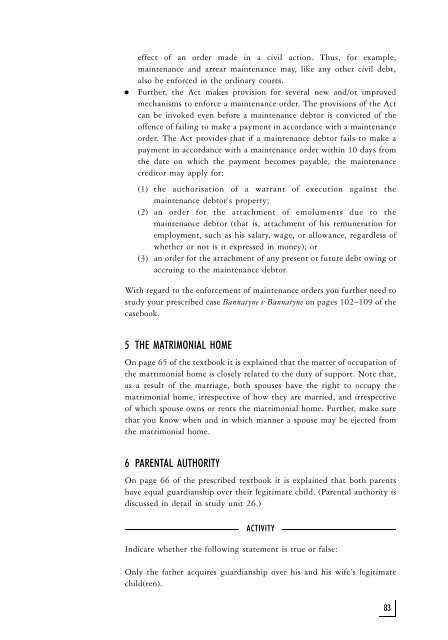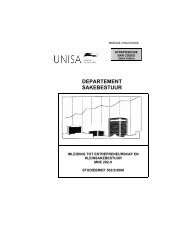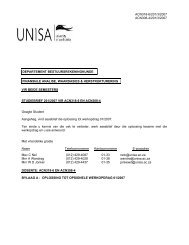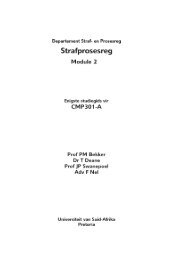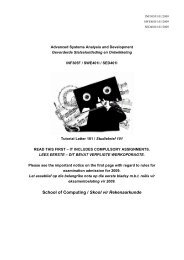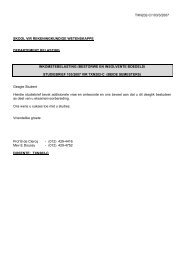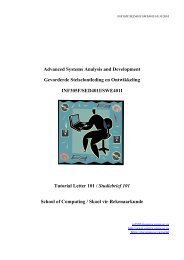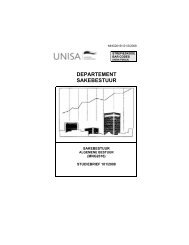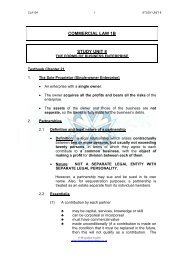key to the study guide - Name
key to the study guide - Name
key to the study guide - Name
Create successful ePaper yourself
Turn your PDF publications into a flip-book with our unique Google optimized e-Paper software.
effect of an order made in a civil action. Thus, for example,<br />
maintenance and arrear maintenance may, like any o<strong>the</strong>r civil debt,<br />
also be enforced in <strong>the</strong> ordinary courts.<br />
. Fur<strong>the</strong>r, <strong>the</strong> Act makes provision for several new and/or improved<br />
mechanisms <strong>to</strong> enforce a maintenance order. The provisions of <strong>the</strong> Act<br />
can be invoked even before a maintenance deb<strong>to</strong>r is convicted of <strong>the</strong><br />
offence of failing <strong>to</strong> make a payment in accordance with a maintenance<br />
order. The Act provides that if a maintenance deb<strong>to</strong>r fails <strong>to</strong> make a<br />
payment in accordance with a maintenance order within 10 days from<br />
<strong>the</strong> date on which <strong>the</strong> payment becomes payable, <strong>the</strong> maintenance<br />
credi<strong>to</strong>r may apply for:<br />
(1) <strong>the</strong> authorisation of a warrant of execution against <strong>the</strong><br />
maintenance deb<strong>to</strong>r's property;<br />
(2) an order for <strong>the</strong> attachment of emoluments due <strong>to</strong> <strong>the</strong><br />
maintenance deb<strong>to</strong>r (that is, attachment of his remuneration for<br />
employment, such as his salary, wage, or allowance, regardless of<br />
whe<strong>the</strong>r or not is it expressed in money); or<br />
(3) an order for <strong>the</strong> attachment of any present or future debt owing or<br />
accruing <strong>to</strong> <strong>the</strong> maintenance deb<strong>to</strong>r.<br />
With regard <strong>to</strong> <strong>the</strong> enforcement of maintenance orders you fur<strong>the</strong>r need <strong>to</strong><br />
<strong>study</strong> your prescribed case Bannatyne v Bannatyne on pages 102±109 of <strong>the</strong><br />
casebook.<br />
5 THE MATRIMONIAL HOME<br />
On page 65 of <strong>the</strong> textbook it is explained that <strong>the</strong> matter of occupation of<br />
<strong>the</strong> matrimonial home is closely related <strong>to</strong> <strong>the</strong> duty of support. Note that,<br />
as a result of <strong>the</strong> marriage, both spouses have <strong>the</strong> right <strong>to</strong> occupy <strong>the</strong><br />
matrimonial home, irrespective of how <strong>the</strong>y are married, and irrespective<br />
of which spouse owns or rents <strong>the</strong> matrimonial home. Fur<strong>the</strong>r, make sure<br />
that you know when and in which manner a spouse may be ejected from<br />
<strong>the</strong> matrimonial home.<br />
6 PARENTAL AUTHORITY<br />
On page 66 of <strong>the</strong> prescribed textbook it is explained that both parents<br />
have equal guardianship over <strong>the</strong>ir legitimate child. (Parental authority is<br />
discussed in detail in <strong>study</strong> unit 26.)<br />
ACTIVITY<br />
Indicate whe<strong>the</strong>r <strong>the</strong> following statement is true or false:<br />
Only <strong>the</strong> fa<strong>the</strong>r acquires guardianship over his and his wife's legitimate<br />
child(ren).<br />
83


